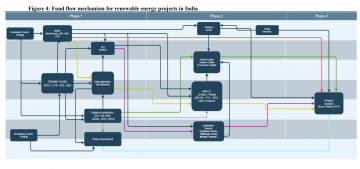The GGKP's Seventh Annual Conference took place on 21-22 October 2019 in conjunction with the Global Green Growth Institute’s Global Green Growth Week 2019 (GGGW2019) on the theme of “Achieving Global Energy Transformation” in Seoul, Republic of Korea.
Dr. Ria Sinha presented her paper “Financing for Renewable Energy Projects: A Case Study of India” in Session B.2: Finance and Investment. Dr. Sinha is a Senior Manager in the Policy and Planning Department at the Development Alternatives Group, working on issues pertaining to climate financing, clean energy and resource efficiency. She holds a PhD in Business Sustainability from the TERI School of Advanced Studies (TERI SAS) in New Delhi, India, where she was an HSBC Scholar, and an MA in Economics from the University of Calcutta. She is also a Visiting Faculty Member in the Department of Business and Sustainability at TERI SAS.
1) Briefly describe the topic and conclusion of your research.
My paper attempts to comprehend the potential sources of funds and the fund flow mechanism of renewable energy investments in India. Additionally, it seeks to recommend certain enabling factors for enhancing private investments by addressing the potential risks and uncertainties. Although there is robust evidence of policy action by the Indian government towards promoting the clean energy sector, an exclusive sector focus has to be given to renewable energy projects instead of emphasizing on the power sector in general. An enabling environment in terms of policy, regulatory framework and market formation needs to be created for financial sustainability of these projects, thereby accomplishing the overarching objectives under India’s nationally determined contributions (NDCs) and fulfilling international commitments.
2) What are the key policy messages/implications?
The key policy implications of the paper focus on:
- Providing capital gains exemption on investment in renewable energy projects through bonds, debt and equity to create a huge incentive for domestic and foreign investors.
- Providing grid charge exemptions to open access solar projects, which will boost domestic investor confidence, and the number of rooftop and small capacity solar projects will increase.
- Creating a single clearance mechanism for the initiation of renewable energy projects, which will lead to shortening the duration time.
- Creating a minimum standard of benchmark for PV panels, which will improve the overall quality of panels being used in the projects and will increase the yield as well as the duration of the project.
- Facilitating power-delivery contracts signed in foreign currencies, which will allow the project developer to repay the debt faster and without the inconvenience of converting the amount from local to foreign currency.
- Strengthening the monitoring mechanism under the National Clean Energy and Environment Fund (NCEEF) so there is effective use of funds.
3) If applicable, please briefly elaborate on the policy framework and financing mechanism.
The financing mechanism of clean projects is clearly illustrated in Figure 4 of the main report.

4) Are there any challenges you would like to underline from this research?
The challenges faced while undertaking the research were mostly in the form of inadequate or concealed information in which some of the respondents were unwilling to share the relevant information. However, that was mostly overcome through appropriate strategies.
5) What are the opportunities for collaboration around this issue?
One of the core areas of Development Alternatives in technological innovation has been renewable energy. In particular, the organization has expertise in working with decentralized energy systems (DRE) and access of electricity to the communities. Our technology innovation initiatives have helped operationalize and provide DRE solutions in the rural areas of Bihar and Uttar Pradesh in India. I believe that these efforts need to be scaled up and more pilots need to be conducted at the ground level. Apart from this, we will also be interested in conducting financial and economic assessments of the existing efforts. I find immense potential from furthering this work with a collaborative approach.
6) Which session are you interested in attending at GGKP7 and why?
I wish to attend all the sessions on both days. The reason for this is that there are several aspects pertaining to clean energy and transformation. After a detailed look at the agenda, I find that all the sessions reflect upon different aspects of the same issue and are interwoven. Hence, it is meaningful to attend all the sessions.

